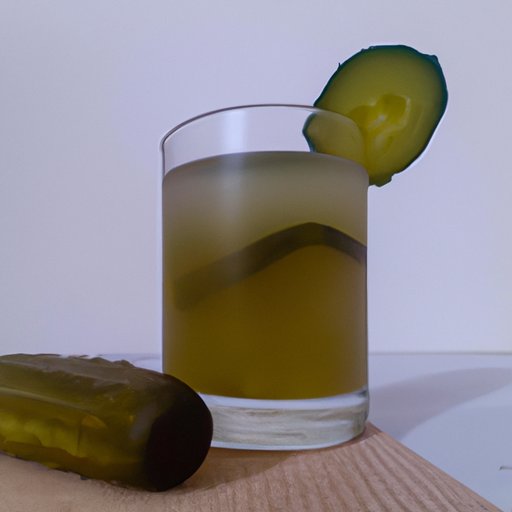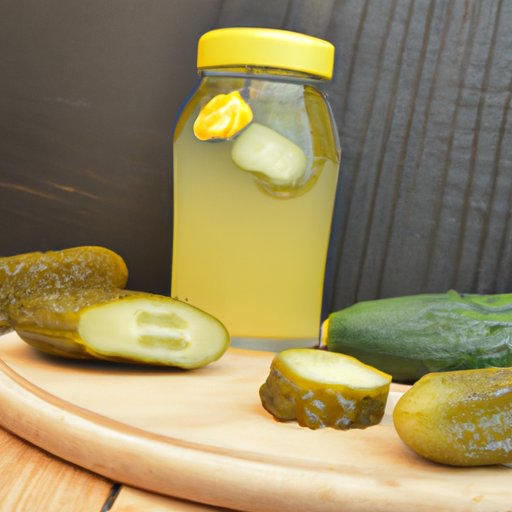Introduction
Pickle juice has become increasingly popular as a beverage in recent years. It is often touted for its purported health benefits, from helping with digestion to providing a boost of electrolytes. But is it really healthy to drink pickle juice? In this article, we will explore the potential health benefits of drinking pickle juice, investigate its nutritional content, and examine the scientific evidence behind its purported health benefits.

A Review of the Health Benefits of Drinking Pickle Juice
Pickle juice is a liquid made from the brine used to ferment cucumbers into pickles. It is high in electrolytes, such as potassium, sodium, and magnesium, which can help replenish fluids in the body. It also contains some vitamins, minerals, and antioxidants that may offer additional health benefits.
Hydration
One of the primary benefits of pickle juice is that it is an excellent source of hydration. It contains electrolytes, which can help replace fluids lost during exercise or other strenuous activities. Additionally, the vinegar in pickle juice helps to reduce dehydration by increasing the absorption of water in the body.
Digestive aid
Pickle juice is also thought to have digestive benefits. The vinegar in the juice can help stimulate digestive enzymes and increase the acidity of the stomach, which can help break down food more efficiently. Additionally, the electrolytes in pickle juice can help improve the movement of food through the digestive tract, aiding digestion.
Potassium, sodium, and other electrolytes
Pickle juice is high in electrolytes, including potassium, sodium, and magnesium. These electrolytes are essential for maintaining proper hydration and can help replace electrolytes lost through sweating during exercise. Additionally, these electrolytes can help regulate muscle contractions, nerve signals, and other bodily functions.
Antioxidants
Pickle juice also contains antioxidants, which can help protect the body from free radical damage. Antioxidants are compounds that can neutralize free radicals, which are unstable molecules that can cause cellular damage. Additionally, some studies have suggested that certain antioxidants found in pickle juice, such as polyphenols, can help reduce inflammation.

Exploring the Pros and Cons of Drinking Pickle Juice
While there are many potential benefits to drinking pickle juice, it is important to consider the potential risks as well. Here, we explore both the pros and cons of drinking pickle juice.
Pros
The primary pros of drinking pickle juice include:
- Hydration: Pickle juice is an excellent source of hydration due to its electrolytes. It can help replace fluids lost during exercise or other strenuous activities.
- Electrolytes: Pickle juice is high in electrolytes, including potassium, sodium, and magnesium. These electrolytes can help regulate muscle contractions, nerve signals, and other bodily functions.
- Potential digestive aid: The vinegar in pickle juice can help stimulate digestive enzymes and increase the acidity of the stomach, which can help break down food more efficiently.
- Antioxidants: Pickle juice also contains antioxidants, which can help protect the body from free radical damage.
Cons
While there are many potential benefits to drinking pickle juice, there are also some potential risks to consider. These include:
- High sodium content: Pickle juice is very high in sodium, so it should be consumed in moderation. Too much sodium can lead to increased blood pressure, kidney disease, and other health issues.
- Potential for sugar and additives: Some brands of pickle juice contain added sugar or other additives. If you are looking for a healthy option, make sure to read the label and choose a brand without added sugar or other additives.
- Unpleasant taste: Pickle juice is an acquired taste, and many people find it unpleasant. If you don’t like the taste, try adding it to a smoothie or other beverage to mask the flavor.
Comparing Pickle Juice to Other Popular Beverages
When considering whether or not to drink pickle juice, it is important to compare it to other popular beverages. Here, we compare pickle juice to water, sports drinks, and juices.
Water
Water is the best source of hydration and should be the first choice for rehydrating after exercise. However, it does not contain electrolytes like pickle juice does. Additionally, plain water can be bland and unappealing, so pickle juice can be a good alternative for those who don’t enjoy drinking plain water.
Sports drinks
Sports drinks are designed to replenish electrolytes lost during exercise. However, they often contain added sugar or other additives, which can be unhealthy. Additionally, many sports drinks contain artificial colors and flavors. Pickle juice, on the other hand, is all natural and does not contain any added sugar or other additives.
Juices
Fruit and vegetable juices are often touted for their health benefits. However, many of them are high in sugar and calories, and some contain added sweeteners or other additives. Pickle juice, on the other hand, is low in sugar and calories and does not contain any added sweeteners or other additives.

Investigating the Nutritional Content of Pickle Juice
It is important to understand the nutritional content of pickle juice before consuming it. Here, we explore the calories, sodium, sugar, potassium, vitamins, and minerals found in pickle juice.
Calories
Pickle juice is low in calories, with one cup containing just 25 calories. This makes it an excellent choice for those looking to maintain a healthy weight.
Sodium
Pickle juice is very high in sodium, with one cup containing over 1,000 milligrams of sodium. Too much sodium can lead to increased blood pressure, kidney disease, and other health issues. For this reason, pickle juice should be consumed in moderation.
Sugar
Pickle juice is naturally low in sugar, with one cup containing just 3 grams of sugar. However, some brands of pickle juice contain added sugar, so it is important to read the label and choose a brand without added sugar if you are looking for a healthy option.
Potassium
Pickle juice is a good source of potassium, with one cup containing around 500 milligrams. Potassium is essential for maintaining proper hydration and can help replace electrolytes lost through sweating during exercise.
Vitamins
Pickle juice is a good source of vitamins, including vitamin A, vitamin C, and vitamin K. Vitamin A is essential for eye health, vitamin C helps support the immune system, and vitamin K helps with blood clotting.
Minerals
Pickle juice is also a good source of minerals, including calcium, phosphorus, and iron. Calcium is essential for strong bones and teeth, phosphorus helps with energy metabolism, and iron helps carry oxygen throughout the body.
Examining the Scientific Evidence for Drinking Pickle Juice
There is limited scientific evidence on the potential health benefits of drinking pickle juice. Most studies have been conducted on animals, so it is difficult to draw conclusions about the effects of pickle juice on humans. Here, we review the available studies on the potential health benefits and risks of drinking pickle juice.
Studies on the potential health benefits
Some studies have suggested that pickle juice may have potential health benefits. For example, one study found that pickle juice helped reduce symptoms of muscle cramps in athletes. Another study found that pickle juice helped reduce oxidative stress in rats. Additionally, some studies have suggested that pickle juice may have potential anti-inflammatory properties.
Studies on the potential risks
There are also some studies that suggest that pickle juice may have potential risks. For example, one study found that drinking too much pickle juice can cause gastrointestinal distress. Additionally, some studies have suggested that pickle juice may increase the risk of kidney stones. It is important to note, however, that most of these studies have been conducted on animals, so it is difficult to draw conclusions about the effects of pickle juice on humans.
Conclusion
Pickle juice has become increasingly popular as a beverage in recent years. It is high in electrolytes, such as potassium, sodium, and magnesium, which can help replenish fluids in the body. It also contains some vitamins, minerals, and antioxidants that may offer additional health benefits. While there are many potential benefits to drinking pickle juice, it is important to consider the potential risks as well, such as its high sodium content and potential for sugar and additives. Additionally, it is important to compare pickle juice to other popular beverages, such as water, sports drinks, and juices. Finally, it is important to understand the nutritional content of pickle juice before consuming it.
Overall, while there is limited scientific evidence on the potential health benefits of drinking pickle juice, it is generally considered safe to consume in moderation. If you are looking for a healthier alternative to sugary beverages or sports drinks, pickle juice may be a good option. Just make sure to read the label and choose a brand without added sugar or other additives.
(Note: Is this article not meeting your expectations? Do you have knowledge or insights to share? Unlock new opportunities and expand your reach by joining our authors team. Click Registration to join us and share your expertise with our readers.)
